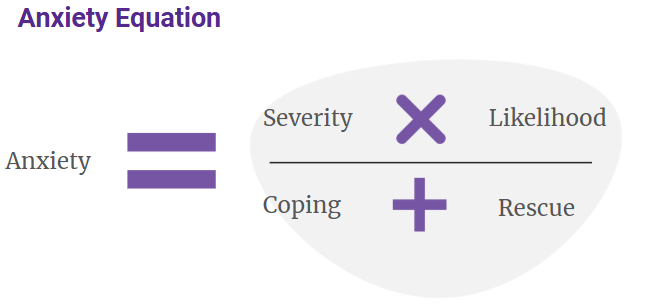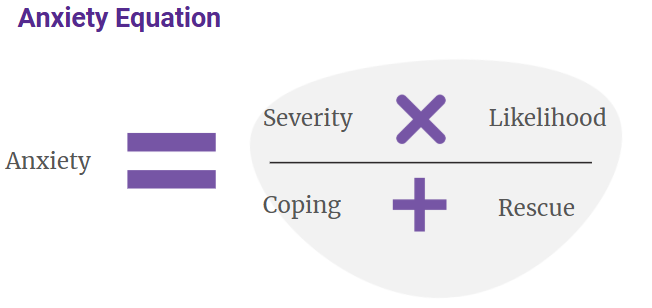Emetophobia: How does the mind decide on what to be anxious about?
What is the purpose of anxiety:
Anxiety is a perfectly crafted system to recognise and to deal with external threats such as predators, fighting off others or when we need to run away from something.
However, due to modern day living there is very little need to fight or run away from danger.
The problem is that Anxiety doesn't know that and continues to do its job and scan for potential threats and applies the rule of needing to fight or run away from it.
But today the modern threats we face are not lions and tigers, but debt, deadlines, social pressure, bills, health, relationships and yes you guessed it, fears around illness and vomiting. And anxiety still thinks running away or fighting these fears works.
But how does the mind decide on what it finds threatening?
When asked “why are you are anxious about something”, most people just give a vague answer such as “I just am”.
However, your mind is actually processing a lot of information into whether or not you find something anxiety provoking or scary.
The best way to explain this is using a tool called The Anxiety Equation. Don’t let the name put you off. No maths required.
It looks something like this:
Anxiety works by looking out for four basic things when it tries to recognise danger. These are:
Severity of the problem - The worse you see the outcome, the more anxiety you will have.
Likelihood of this problem occurring -The more likely you perceive the worst to occur the more anxious you will feel.
Ability to cope with the problem - If you feel you will cope well if your fear occurs then you will feel less anxious, but if you feel you won’t cope well then you will be more anxious.
Support others can provide with the problem - If you feel supported by others if the worst was to happen this can help reduce your anxiety as you have support to cope. Whereas if you feel less supported, you will feel more anxious.
A combination of these four things are present in every situation anxiety is worried about. This creates a small formula or “equation” on if anxiety perceives a danger or not.
How does this relate to my fear of vomiting:
Severity:
Ask yourself what are you predicting to happen if you were to catch an illness, get food poisoning or to vomit. I can imagine you are predicting something severe or highly unpleasant. Common fears for those with Emetophobia can be:
Fear of the symptoms: Often the physical sensations of nausea, tightness in the throat or other anxiety symptoms can be seen as awful (Craske, Barlow and Antony, 2006).
Fear of health complications: Those with Emetophobia often believe vomiting is dangerous, lasts forever, or can even lead to death.
Intolerable: Vomiting or its symptoms can feel intolerable or the worst thing ever. It is not uncommon for patients to view vomiting as 100% awful and even prefer death to vomiting (Veale, 2009).
Social fears: Some people have a perception of social judgment or stigma regarding vomiting.
Disgusting: The act of vomiting can be seen as disgusting or shameful.
If you are seeing the outcome as highly severe. It’s understandable you feel anxious.
However, “severity” doesn’t paint the whole picture. For example, being hit and killed by a falling meteor is highly severe, but I can’t imagine many people spend their life in fear of that. Why?… Because it is unlikely.
Likelihood:
The next factor is how likely your mind thinks this outcome is going to occur. It doesn’t matter how likely it is in reality. It only matters how likely you feel it is.
Those with Emetophobia:
Feel that vomiting is likely to occur: Despite most saying they have not vomited in years.
Feel they have more control over vomiting: Those with Emetophobia often believe they have not vomited due to the actions they have taken. However some evidence shows this is true, but only prevents 1 occurrence every 10 years compared to non-emetophobics.
Feel more at risk of food poisoning.
Feel more at risk of norovirus.
Use nausea as evidence: Those with Emetophobia often use the fact they have nausea as evidence that they are more prone to vomiting. However, this nausea is nearly always caused by the unhelpful actions they take rather than an actual need to vomit. This could be a whole blog post itself!
Ask yourself how likely your fears feel? I am guessing you feel it is likely. No wonder you are anxious.
It’s not all about the severity and likelihood. There are two more factors. Our ability to cope and if we feel others will support us (rescue). These usually act as a preventative factor against anxiety. However, if we don’t have faith in these two factors we can feel vulnerable and more anxious.
Coping:
We all have an idea of how well or not we would cope with situations. When our mind see’s a threat it automatically considers how well we can handle, overcome or beat the challenge. If we feel we can cope, then we feel less anxious about it occurring. If we feel we won’t cope… well that’s just another reason to feel anxious.
Those with Emetophobia:
Have a perception that they cannot cope if they were to vomit.
Often lack effective coping strategies: Due to over relying on coping by avoiding their fear, you don’t have a chance to learn to cope.
Fear of the intensity of symptoms: You may feel that you are unable to handle symptoms (e.g. heaving, the taste of acid etc).
Fear of social repercussions: You might not feel able to cope with the embarrassment or social repercussions of vomiting.
Fear of long term effects: Some people have an incorrect belief that vomiting has long term health effects. This can lead to feeling unable to cope if this was to occur.
So how much faith do you have in your ability to cope? If it’s lacking, then it makes sense you are anxious.
Rescue:
The last factor is how much support you feel you will get from others.
Those with Emetophobia:
Feel no one can help them.
They will be on their own.
If they vomit in public, people will just stare.
Other people will be busy around them panicking rather than helping.
Danger: If your fear is choking or other dangerous outcomes, you may feel no one can help prevent this or help during.
So how much faith do you have in others to help you. If it’s lacking, then it makes sense you are anxious.
Make your own:
Try drawing out your own equation. This can help you be more aware of how your mind is thinking. Once you are aware of this, it can help you see if your thinking is accurate or not.
I hope you have found this useful in understanding how your mind decides on what to feel anxious about.
Written by David Kaneria - CBT Therapist
Emetophobia is treatable. Reach out for support from a trained CBT therapist.







